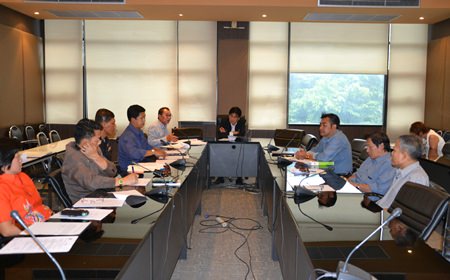Pattaya is again preparing new rules and regulations to govern the number and behavior of beach masseuses.
Deputy Mayor Ronakit Ekasingh presided over an Aug. 28 meeting with city legal officers, Public Health Department staffers and officials responsible for Jomtien Beach, where 429 massage vendors ply their trade.
The meeting was called following a July resolution by the Pattaya City Council to reduce the number of masseuses and give them a strict set of regulations to follow. There had been a number of complaints about indecent behavior during massages, theft of customer property, and unfair pricing.
 Deputy Mayor Ronakit Ekasingh (center) chairs a meeting to prepare new rules and regulations to govern the number and behavior of Jomtien Beach masseuses.
Deputy Mayor Ronakit Ekasingh (center) chairs a meeting to prepare new rules and regulations to govern the number and behavior of Jomtien Beach masseuses.
Pattaya has attempted for years to bring order to beach, setting up committees in 2011 and 2013, then extracting new promises for them to behave earlier this year. All have proved ineffective.
A survey found 238 vendors worked in the stretch of Jomtien from Pattaya Park to Dongtan Beach regulated by a massage club; 126 from the Dongtan curve to Caza; 41 working from there to Jomtien Condo, 18 from that building to the Nang Nual seafood restaurant, and 19 at the end of Soi 19.
Officials noted that the number of vendors currently was lower than normal due to low season and the facelift of the Jomtien beachfront.
The survey also found that many masseuses lacked standard massage training and were uncertified; or employed unsanitary practices, such as using the same piece of cloth for the entire body.
The city has appointed committees to organize the vendors in Jomtien by seeking cooperation from operators, with the president of the Beach Masseuses Club finding ways to prevent problems and control vendors based on an earlier agreement with Sansuk Sub-district in Chonburi as a model.
Included in that agreement are license and garbage-collection fees, nationality checks, and sanitary inspections. Vendors also must attend training for up to 75 hours and receive a certificate approved by a government ministry.
Faking a license or operating without one would be considered a criminal offense.
Pattaya would set operating hours, require vendors to keep their areas clean and mandate changes to operating conditions.
Zoning assignments would be set by lottery and moving from one zone to another would need to be approved by city hall. Sanitary requirements also would be codified, such as using anti-bacterial gel for hand-washing, and masseuses can only bring to the beach items related to their work.
Finally, addressing complaints by beach users, masseuses must use only a portable massage bed and would be prohibited from calling tourists to use their services and trying to sell them other goods. Agents would not be permitted to carry the bed for the masseuse.
If any complaint occurs regarding pricing, quality of service, or sales of other items, the city could suspend or terminate the masseuse’s license.
All the rules, and numerous smaller provisions, are still up for consideration with a committee to determine the final agreement to be set with vendors.




